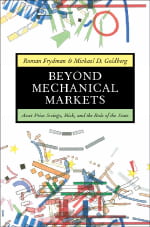By Roman Frydman & Michael D. Goldberg
Table of Contents | Introduction | Epilogue
For more information, please visit the Princeton University Press website.
 Endorsements
Endorsements
“This important book addresses fundamental questions about macroeconomic and financial modeling that too often are sidestepped. It challenges assumptions that are routinely made, both by orthodox theory and by popular ‘behavioral’ alternatives; still more provocatively, it proposes a way forward, under which economic analysis remains possible, though shorn of some of its pretensions. These are issues with which all students of macroeconomics and finance will have to grapple, and Frydman and Goldberg provide a lively and impassioned opening to what will surely prove one of the crucial debates of our time.” – Michael Woodford, author of Interest and Prices
“This is a brilliant, subtle, and powerful book, by far the best work of economic theory that the global financial crisis has yet produced. If any account deserves to rescue formal economics from the dead end that it has reached, and restore the connection between what economists tell you and what actually happens, this is it.” – Robert Skidelsky, author of Keynes: Return of the Master
“The economy is not just mechanical; much change is nonroutine. In turn, many important economic decisions are also nonroutine. Based on this insight, Frydman and Goldberg give us a new theory of the business cycle. In market after market, they convincingly argue its realism. What’s more, Beyond Mechanical Markets gives us a doctor’s prescription for dampening–and possibly even avoiding altogether–the next economic crisis.” – George A. Akerlof, Nobel Laureate in Economics
“This book is a milestone. It breaks important new ground in the refoundation that macroeconomics and finance so badly need. The authors’ rereading of Keynes will come as a revelation both to Keynesians and behavioralists .” – Edmund S. Phelps, Nobel Laureate in Economics
“The year 2008 saw not only financial failure but the failure of an idea, the economic theory in which financial markets are mechanically determined to settle at equilibrium and economically efficient prices. Roman Frydman and Michael Goldberg demonstrate clearly the fallacy of that idea. Their powerful analysis provides insights which can help us reduce the probability and severity of future crises.” – Adair Turner, chairman of Britain’s Financial Services Authority
“Beyond Mechanical Markets is a potential turning point in economics. Frydman and Goldberg offer a view that is not only new but almost certainly correct–and that has far-reaching implications. After reading Beyond Mechanical Markets, other economics books seem old-fashioned.” – Richard Robb, Columbia University
From the reviews
Read the full reviews here
“[Beyond Mechanical Markets points to] a new international order [that] can save lives and stop currencies collapsing.” – Anatole Kaletsky, The Times
“The debate over how to re-regulate [markets and banks] to avoid another financial crisis is urgent and it cannot conclude without resolving the problem that economics’ most basic assumption is flawed. [Beyond Mechanical Markets is one] of the most interesting contributions [to] find a new way to model markets.” – John Authers, Financial Times
“[Beyond Mechanical Markets] marshals a powerful argument that’s bolstered by empirical reality: the eternal failures of mechanical forecasting; the sheer difficulty of beating the market with consistency; the unforeseeable ways that history unfolds. . . . [It’s approach] seeks to reach beneficial outcomes through flexible, empirical response to [changing] conditions.” – Robert Teitelman, Huffington Post
“The argument of this original and important book is that …economic models still used by central banks and others are seriously misleading and basically useless in dealing with a real world in which individuals are making imperfect and unpredictable interpretations of economic events….The authors’ practical recommendations for policy are interesting and they can hardly be accused of a lack of boldness.” – Graham Bannock, Central Banking.com
“[A] groundbreaking look at how to tame asset booms and busts. . . . [O]f all the books I’ve read on the crisis that began in 2007, this one comes closest to laying foundation for a more pragmatic and genuinely useful school of economics.” – James Pressley, Bloomberg News
Full reviews
The Deal Magazine, Transactions: Oct. 31, 2011 (Robert Teitelman, 10/28/2011),
Huffington Post, The Nobel and the Debate Over Markets (Robert Teitelman, 10/20/2011),
Central Banking.com, Frydman and Goldberg, Beyond Mechanical Markets (Graham Bannock, 6/11/2011),
Huffington Post, Frydman and Goldberg’s Beyond Mechanical Markets (Robert Teitelman, 5/25/2011),
Bloomberg News, Robo-Investors Beware (James Pressley 5/3/2011),
Financial Times, Sirens or hobgoblins, consistency depends on the context (John Kay, 4/20/2011),
Financial World, Theory Fanatics (Keyar Patel, 4/2011),
Financial Times, Better Models Alone Won’t Avert Crisis (James Mackintosh, 4/18/2011),
The Times, Pragmatism is king in our vague new world (Anatole Kaletsky, 3/25/2011),
Financial Times, We need new models in an uncertain world (John Authers, 3/12/2011),
The Economist, Killing off the Monster (Buttonwood, 2/24/2011),
For a pre-publication article highlighting the book’s approach, see the Wall Street Journal, Economist’s Grail: A Post-Crash Model (Mark Whitehouse, 11/30/2010).
You can also read about the book in Financial Times Deutschland, New Thinkers: We don’t know it either (Mathias Ohanian, 3/23/2011),
Frankfurter Allgemeine Zeitung, Mechanical Markets: Two economists in search of a realistic theory (Gerald Braunberger, 3/21/2011),
Il Sole 24 Ore, Giving up perfection to understand markets (Riccardo Sorrentino, 3/15/2011),
Corriere della Sera, Crisis: Bubbles? They can work, but only with a limit (Federico Fubini, 3/14/2011),
Financial Times Deutschland, The economy doesn’t operate mechanically (Mathias Ohanian, 3/10/2011),
Borsen, Denmark, Simmering Confrontation with Economic Dogmas (Thomas Berndt Henriksen 1/24/2011).
For interviews, podcasts and video clips about the book, please visit The Guardian, Broken economic models and the role of emotion in finance (Heather Stewart, 3/2/2011),
CNBC Europe, Rethinking Free Market Theory (Squawk Box, 3/3/2011),
Bloomberg TV, Midday Surveillance with Tom Keene (4/7/2011),
Eleftherotypia Athens, There is no perfect market (C.J. Polychroniou, 3/13/2011),
Frankfurter Allgemeine Zeitung, Buffett and Soros Aren’t Interested in Psychology (Gerald Braunberger, 3/18/2011),
Der Standard, Vienna, Markets aren’t Casinos (András Szigetvari, 3/9/2011).
For more information about Beyond Mechanical Markets: Asset Price Swings, Risk, and the Role of the State, please visit the Princeton University Press website.